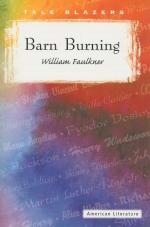|
This section contains 838 words (approx. 3 pages at 400 words per page) |

|
In one sense, criticism of "Barn Burning" has displayed a remarkable unanimity, for this story throws into sharp relief a young boy's existential choice involving the two notions of "blood relation" and "morality." Whatever conclusion individual critics draw about the tale, their arguments necessarily center on the meaning of that choice. In preparing to read the story and again in considering it afterwards, readers must ask themselves a key question: If family ties constitute a moral obligation on the individual, is there any higher morality which might require the individual to act against a family member? This is the question that ten-year-old Sarty confronts—and answers.
Early reactions to Faulkner's modernistic work in general reflected the uneasiness that modernism itself inspired in the older generation of traditional critics. As late as 1941, Warren Beck could write that Faulkner had been "severely criticized for his style" but...
|
This section contains 838 words (approx. 3 pages at 400 words per page) |

|




